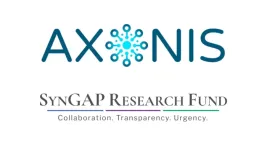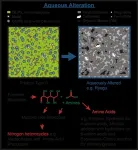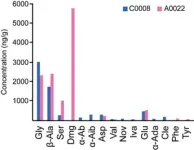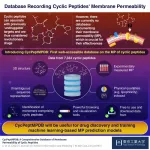(Press-News.org) PALO ALTO, Calif. (April 5, 2023) – SynGAP Research Fund (SRF), a 501(c)(3) public charity whose mission is to improve the quality of life for SYNGAP1 patients through the research and development of treatments, therapies and support systems, today announced they have awarded a $130,000 collaborative grant to the lab of Xing Tang, PhD at Boston Children's Hospital & AXONIS Therapeutics to investigate the treatment effects of KCC2-enhancing small molecule compounds in SYNGAP1 haploinsufficiency.
Principal Investigator of translational neuroscience at AXONIS, Dr. Kadam, has been working with the SRF community for many years. While at Johns Hopkins, she gave a popular SRF Webinar on some of her SYNGAP1 research. “When Dr. Kadam joined AXONIS and asked if SRF would be interested in supporting some of their work, we agreed immediately,” said Michael Graglia, Managing Director of SRF. “Dr. Kadam’s commitment to helping patients is clear. Supporting AXONIS’ collaboration with Dr. Tang is about as good as it gets for a patient-family led organization. This is precisely the kind of work the Fund exists to support on behalf of the ~1,200 people we know who are currently living with this ultra rare disease, still without treatment or cure.”
The therapeutic target - KCC2
KCC2 is a neuron-specific, electroneutral chloride transporter that is essential for ensuring the activities of neurons in the brain can be inhibited when necessary. KCC2 extrudes chloride to maintain low chloride concentrations in neurons, which allows inhibition upon GABA receptor activation. In some neurodevelopmental disorders, KCC2 is downregulated leading to Excitatory/Inhibitory (E/I) imbalance within the neural network. Without KCC2, affected neurons no longer respond appropriately to inhibitory inputs, causing dysfunction in neural circuits and impaired neurological functions, such as pain, paralysis, spasticity, seizures and intellectual disabilities.
Treatments that enhance KCC2 to restore E/I balance have been shown to restore normal functions in several preclinical models of neurological disorders (e.g., Rett syndrome, epilepsies). Currently, no KCC2-enhancing drugs exist on the market.
The researcher - Dr. Tang
Dr. Tang is an Assistant Professor of Neurosurgery at Boston Children’s Hospital and Harvard Medical School. He received his Ph.D. in Neurobiology from Pennsylvania State University, and completed his postdoctoral training at the Whitehead Institute for Biomedical Research/MIT. His scientific interest has been focused on understanding the molecular and cellular basis of pediatric brain disorders in order to ultimately develop therapeutics that can be translated to the clinic to improve patient care. His work led to the discovery of the first group of small molecule compound drugs that stimulates KCC2 expression in neurons, which has shown promising results in rescuing disease-related phenotypes in human neuron and mouse models of Rett syndrome.
Dr. Tang said “We are very grateful to the SynGAP Research Fund for supporting this collaborative work between my lab and AXONIS. We will use SynGAP patient iPSC-derived human neurons provided by SRF partner, Rarebase, to test the feasibility of a novel therapeutic approach that restores KCC2 expression or activity to reduce the neural network hyperexcitability that causes seizures in the brains of SynGAP patients. I had a very special experience attending last year’s SRF-organized research conference and meeting with members of the SynGAP community. Their courage, enthusiasm and positive energy are contagious. It is the cherished hope of myself and my team that the work we do here in the lab can one day make a difference in the lives of SynGAP patients for the better.”
SRF Volunteer Minnie Zhou, DNP, CRNA, recalls “Dr. Tang and I met at the SRF conference in Nashville last year. He is an extremely approachable scientist who truly cares about helping children with SYNGAP1. He met my affected daughter and mentioned his daughter of a similar age and wished she were in attendance so they could play together. I am grateful SRF is funding researchers such as Drs. Tang and Kadam; both with such zeal about improving the lives of children with brain disorders.”
The company - AXONIS
AXONIS Therapeutics is advancing breakthrough drug discoveries to develop first-in-class therapies for neurological disorders, to make a real difference for patients, their families, and the global healthcare system. AXONIS’ oral KCC2 potentiator drugs restore excitation/inhibition balance to dysfunctional central nervous system circuits in order to treat patients with seizures, motor and sensory problems, and chronic pain.
Chief Scientific Founder and Co-Founder Dr. Shane Hegarty, PhD, says, “We are grateful to the SynGAP Research Fund for providing access to critical resources for performing key proof-of-concept studies on our KCC2-potentiating therapies in patient-derived neuron and glia models of SYNGAP1 syndrome. SRF has built an important platform which enables high-impact research and collaborations, which I hope will facilitate new treatments for SYNGAP1 patients.”
Principal Investigator, Dr. Shilpa Kadam, PhD, commented “This is a unique collaboration between academia/biotech, bringing researchers with a common goal to help drive early and safe interventional trials for the SYNGAP1 patient community using promising small molecule drugs. The clinical impact for this investigation is promising. Given the validated potential of KCC2 modulation in correcting E/I balance in neurons, we are excited for the support and opportunity to deliver new therapies to this patient community.”
About SYNGAP1
SYNGAP1-related intellectual disability (ICD-10 F78.A1) is a rare genetic disorder caused by variants on the SYNGAP1 gene that reduce SynGAP protein levels. This protein acts as a regulator in the synapses (where neurons communicate with each other). When SynGAP protein levels are too low, we see an increase in excitability in the synapses making it difficult for neurons to communicate effectively. This leads to many neurological issues seen in SynGAP patients.
Symptoms of SYNGAP1 include: intellectual disability; epilepsy; hypotonia (low muscle tone); gross and fine motor skill delays; autism spectrum disorder; gastro-intestinal disorders; sleep and behavior disorders and visual abnormalities.
About AXONIS Therapeutics
AXONIS Therapeutics, Inc. is a biotechnology company based in Cambridge, MA, committed to advancing breakthrough drug discoveries to develop first-in-class therapies for currently incurable neurological disorders. AXONIS Therapeutics is progressing a pipeline of neuron-reviving therapeutics which enable an intrinsic ability of central nervous system (CNS) neurons to resist degeneration; restore excitation/inhibition balance; and regenerate, with the goal of making a real difference for patients, their families and the global healthcare system. For more information, visit https://axonis.us/.
About the Tang Lab
The Tang Lab at Boston Children’s Hospital is dedicated to drug discovery for treating brain diseases. The lab studies the molecular, cellular, and neural-network basis of human brain diseases to ultimately develop precision medicine therapeutics. With a focus on neurodevelopmental disorders, epilepsy, and brain tumors, researchers in the Tang lab develop innovative small molecule, nucleic acid, and cell therapeutic strategies to treat or even cure such devastating brain diseases.
About the SynGAP Research Fund
The mission of the SynGAP Research Fund is to improve the quality of life for SYNGAP1 patients through the research and development of treatments, therapies and support systems. SRF was founded in the US in 2018 as a 501(c)(3) US public charity, and families created sister organizations for SRF in the UK in 2020, in Europe (Netherlands) in 2022 and in Latin America (Colombia) in 2023. Completely parent-led, SRF is the largest non-government funder of SynGAP research having committed over $3.5 million in grants to date. The founders cover all operational costs, ensuring donations fund progress, not foundation overhead. SRF’s grant program awards one or two-year grants to young investigators, physician residents, and clinicians who are interested in studying SYNGAP1. SRF grants are intended to help researchers explore novel ideas and answer questions related to the clinical aspects, therapies and/or genetic causes of SYNGAP1. SRF is a member of the COMBINEDbrain, Global Genes Foundation Alliance, the Everylife Foundation Community Congress, Personalized Medicine Coalition, Rare Epilepsy Network, and Epilepsy Leadership Council.
For more on SRF, visit: SyngapResearchFund.org or follow @cureSYNGAP1
END
SynGAP Research Fund awards a collaborative grant to Tang Lab & AXONIS Therapeutics
The grant will fund the investigation of treatment effects of KCC2-enhancing small molecule compounds in SYNGAP1 haploinsufficiency syndrome
2023-04-05
ELSE PRESS RELEASES FROM THIS DATE:
Manganese in Central Valley water threatens fetuses and children
2023-04-05
Water in California’s Central Valley contains enough manganese to cause cognitive disabilities and motor control issues in children, and Parkinson’s-like symptoms in adults.
A naturally occurring metal, manganese is found in water supplies throughout the world. It is regulated as a primary contaminant in many Southeast Asian countries where the climate causes it to leach into groundwater. However, in the U.S. it is regulated only as a secondary contaminant, meaning no maximum level is enforced.
A ...
Do altered gut microbes affect risk of attention-deficit/hyperactivity disorder?
2023-04-05
New research published in the Journal of Child Psychology and Psychiatry suggests that the microbial composition of the gut may affect a child’s susceptibility to attention-deficit/hyperactivity disorder (ADHD).
The human gastrointestinal tract hosts a large population of microorganisms such as bacteria, viruses, and fungi. When investigators compared fecal samples from 35 children with ADHD and 35 healthy controls, samples from children with ADHD had higher levels of certain species of fungi and lower levels of other species.
In experiments with cells grown in the lab, one species in abundance in ...
Can a drug used to treat liver disease help prevent SARS-CoV-2 infections and lessen COVID-19 severity?
2023-04-05
SARS-CoV-2, the virus that causes COVID-19, attaches to a cellular receptor called angiotensin-converting enzyme 2 (ACE2), and activation of the farnesoid X receptor increases ACE2 expression. New research published in the Journal of Internal Medicine suggests that a drug that inhibits the farnesoid X receptor and is used to treat liver disease may decrease SARS-CoV-2 infections and reduce the severity of COVID-19.
The study ran from March 2020 to February 2022 and included 3,214 patients with liver disease, half of whom were taking the drug, called ursodeoxycholic acid (UDCA). ...
Can some snakes do cartwheels to escape or startle predators?
2023-04-05
In research published in Biotropica, investigators report that the Dwarf Reed Snake (Pseudorabdion longiceps) performs cartwheels when threatened. This is the first time such an active rolling motion has been documented in snakes, with images and a detailed description.
The Dwarf Reed Snake is a nocturnal, small snake that lives in regions of Southeast Asia. Typical defense mechanisms that small snakes use against predators include fleeing, camouflage, coloration, odors, death-feigning, and intimidation. ...
Can phototherapy improve cognitive function in patients with dementia?
2023-04-05
In an analysis of published clinical trials, investigators found that phototherapy—or exposure to sessions of bright light—may be a promising non-pharmacological intervention for lessening symptoms of dementia.
The analysis in Brain and Behavior included 12 randomized clinical trials. Results indicated that phototherapy improved cognitive function in patients with dementia, but it did not affect symptoms of depression or sleep quality.
“Further well-designed studies are needed to explore the most effective clinical implementation ...
Could a novel small molecule slow or reverse the effects of Duchenne muscular dystrophy?
2023-04-05
In a new study published in The FASEB Journal, investigators demonstrated the potential of a molecule that may help overcome some of the devastating symptoms of Duchenne muscular dystrophy (DMD), the most common life-limiting congenital neuromuscular disorder. The agent promotes the activity of AMP-activated protein kinase (AMPK), an important fuel-sensing enzyme that is present in all mammalian cells.
Previous research has shown that stimulating AMPK can mitigate the dystrophy—or wasting—of muscles, but AMPK activators have failed to reach the clinic due to either their lack of potency or toxic off-target effects.
In ...
CycPeptMPDB: A database aimed at promoting drug design using cyclic peptides
2023-04-05
CycPeptMPDB, a novel database—created by Tokyo Tech researchers—focused on the membrane permeability of cyclic peptides, could accelerate the development of drugs based on these promising compounds. This database was created by gathering published information on thousands of cyclic peptides and organizing it neatly in an online-accessible platform. Thanks to its search and visualization capabilities, CycPeptMPDB could pave the way to new computational and machine learning methods for screening and designing drugs with cyclic peptides.
One of the ...
Brain injury toolkit helps support domestic violence survivors
2023-04-05
COLUMBUS, Ohio – A new approach to trauma-informed care developed by domestic violence survivor advocates and researchers at The Ohio State University has been found in a new study to improve support organizations’ care for survivors by better recognizing brain injury and addressing its often long-lasting repercussions.
The study appears in the Journal of Head Trauma and Rehabilitation.
CARE is the first trauma-informed approach that considers brain injury in the complex set of circumstances to be addressed and accommodated in order ...
Aging at AACR Annual Meeting 2023
2023-04-05
Impact Journals (Aging's publisher) is proud to participate at the American Association for Cancer Research (AACR) Annual Meeting 2023, which convenes April 14-19 in Orlando, Florida.
BUFFALO, NY-April 4, 2023 – Impact Journals will be participating as an exhibitor at the American Association for Cancer Research (AACR) Annual Meeting 2023 from April 14-19 at the Orange County Convention Center in Orlando, Florida. This year, the AACR meeting theme is: “Advancing the Frontiers of Cancer Science and Medicine.”
Impact ...
A cold-specialized icefish species underwent major genetic changes as it migrated to temperate waters, new study finds
2023-04-05
Many animals have evolved to tolerate extreme environments, including being able to survive crushing pressures of ocean trenches, unforgiving heat of deserts, and limited oxygen high in the mountains. These animals are often highly specialized to live in these specific environments, limiting them from moving to new locations. Yet, there are rare examples of species that once lived in harsh environments but have since colonized more temperate settings. Angel Rivera-Colón, a former graduate student now postdoc in the lab of Julian Catchen (CIS/GNDP), an associate professor in the department ...
LAST 30 PRESS RELEASES:
Brainwaves of mothers and children synchronize when playing together – even in an acquired language
A holiday to better recovery
Cal Poly’s fifth Climate Solutions Now conference to take place Feb. 23-27
Mask-wearing during COVID-19 linked to reduced air pollution–triggered heart attack risk in Japan
Achieving cross-coupling reactions of fatty amide reduction radicals via iridium-photorelay catalysis and other strategies
Shorter may be sweeter: Study finds 15-second health ads can curb junk food cravings
Family relationships identified in Stone Age graves on Gotland
Effectiveness of exercise to ease osteoarthritis symptoms likely minimal and transient
Cost of copper must rise double to meet basic copper needs
A gel for wounds that won’t heal
Iron, carbon, and the art of toxic cleanup
Organic soil amendments work together to help sandy soils hold water longer, study finds
Hidden carbon in mangrove soils may play a larger role in climate regulation than previously thought
Weight-loss wonder pills prompt scrutiny of key ingredient
Nonprofit leader Diane Dodge to receive 2026 Penn Nursing Renfield Foundation Award for Global Women’s Health
Maternal smoking during pregnancy may be linked to higher blood pressure in children, NIH study finds
New Lund model aims to shorten the path to life-saving cell and gene therapies
Researchers create ultra-stretchable, liquid-repellent materials via laser ablation
Combining AI with OCT shows potential for detecting lipid-rich plaques in coronary arteries
SeaCast revolutionizes Mediterranean Sea forecasting with AI-powered speed and accuracy
JMIR Publications’ JMIR Bioinformatics and Biotechnology invites submissions on Bridging Data, AI, and Innovation to Transform Health
Honey bees navigate more precisely than previously thought
Air pollution may directly contribute to Alzheimer’s disease
Study finds early imaging after pediatric UTIs may do more harm than good
UC San Diego Health joins national research for maternal-fetal care
New biomarker predicts chemotherapy response in triple-negative breast cancer
Treatment algorithms featured in Brain Trauma Foundation’s update of guidelines for care of patients with penetrating traumatic brain injury
Over 40% of musicians experience tinnitus; hearing loss and hyperacusis also significantly elevated
Artificial intelligence predicts colorectal cancer risk in ulcerative colitis patients
Mayo Clinic installs first magnetic nanoparticle hyperthermia system for cancer research in the US
[Press-News.org] SynGAP Research Fund awards a collaborative grant to Tang Lab & AXONIS TherapeuticsThe grant will fund the investigation of treatment effects of KCC2-enhancing small molecule compounds in SYNGAP1 haploinsufficiency syndrome




